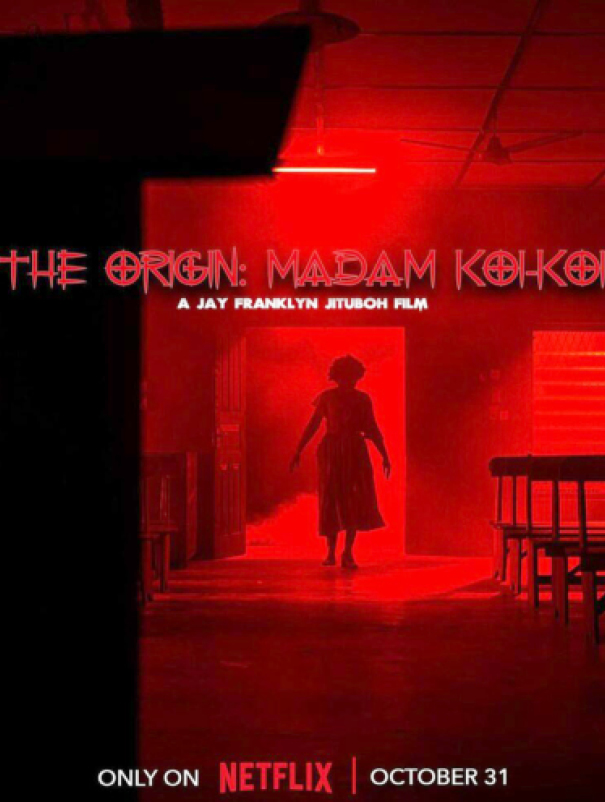The Origin: Madam Koi-Koi begins with Amanda (Martha Ehinome) and her mother (Bolaji Ogunmola) driving into her new school in Malomo in 1991. Amanda’s mother has recently lost her job in a different city causing her to have to relocate and switch her daughter’s school, but Amanda has bad feelings about this school and we soon realise the reasons why.
On the first day, Amanda sees the ‘popular kids’ while at the welcome assembly and her new found friend Edna (Nene Nwanyo) warns her to stay away from them. Edna’s not exactly sure why but she says that ‘everyone who spends time with them always ends up crying’. Soon enough, history repeats itself as Ibukun (Ejiro Onajaife), the girl seen with the popular kids during the assembly is soon gang raped by all four boys. Soon after it happens, Idowu (Iremide Adeoye) the boy who led her into the trap, is killed by an unknown being as he tries to chase after her. And as such Madam Koi-Koi enters the scene.
In the scene where Idowu is attacked, it is set up in such a way that the viewer is unsure whether ‘Madam Koi-Koi’ is aiming for Idowu or for Ibukun. After it ends up being Idowu and Ibukun gets away unscathed, it initially seems like an uncoordinated attack. However, when the next victim is a village drunkard and the one after that is a thief that attacks an older woman, we soon see that Madam Koi-Koi might be taking on some sort of vigilante role in this movie. Which is one of the most interesting things about the chapter/film. While it is a horror story, it is really just a regular story with some arguably scary things happening in the background.
The way the story is written the question of “who the actual villain in the movie is” never escapes the viewers mind. Is it Madam Koi-Koi who goes about killing people (but actually only killing arguably ‘bad’ people)? Is it Mother Superior (Ireti Doyle) who is so fixated on saving her school, for yet unclear reasons, that she is willing to cover up a student’s murder as well as the gang-rape of another female student (which has possibly happened more than once before according to Edna’s story)? Or is it Lashe’s gang that has turned the entire school into their playground and that has turned the school’s principal into their puppet? There is no clear answer and while there is still a whole other chapter of the series for it to be answered, the ability to create such questions in the viewer’s mind with the writing is worth applauding.
Comprehensive migration, visa policies review underway – Tunji-Ojo
Retreat: Tinubu warns ministers against personal ambitions
As a horror movie/series, Madam Koi-Koi is yet to get to the scary parts in the first chapter. And I say this as someone who has a hard time watching Scooby Doo out of fear. While all the ingredients are there from the music to the monster and the lighting and coloring, for some reason, it is yet to translate into any shaking within the audience’s bones. Hopefully that will materialize in the second part.
The first chapter of The Origin really pulls you in with nostalgia. Especially if you are an African child who has gone to boarding house at some point or the other. The little motifs of “Lights Out” being called, the uniforms, the bunks, the senior-junior treatment etc. serves as a call-back to a younger time in our lives. And the writers intelligently lace it in a manner that, hopefully, now with adult lenses the audience is able to identify the little pieces of our nostalgic past that might not have been the healthiest. These pieces include things like the absolute power of the Principal, the favoritism that shows forth, the unwarranted and unhealthy hazing of junior students and all this before we even get to the rape.
The writing and the story itself is the star of the show here. One cannot but appreciate how the writers have really made a story about the strong depths of sexual abuse within the fabric of our society while dressing it up in a garb of a horror story. It works so far because neither the Madam Koi-Koi parts nor the abuse parts have as yet been neglected. The motif of the final scenes with the three men rape juxtaposed against the three main members of Lashe’s crew and the attitude of Detective Oscar (Baaj Adebule) who walks through a secondary school while checking out young girls and confidently sexualising them out loud is poignant. It shows how it is the culture to have men who believe women’s bodies are their rights and raise the next generation of men to believe the same and know that they can get away with whatever actions they take in that regard. Up to the extent that even other women will help them cover up these actions.
The actors who play the young kids are splendid, especially Iremide Adeoye. Adeoye has limited scenes in the show but in the few where he is present he does such a good job of expressing the depth and breadth of his characters emotions without using words. All the other actors are also great to watch making this one week wait for the second part a bit harder to endure.
Culled from www.nollywoodreinvented.com

 Join Daily Trust WhatsApp Community For Quick Access To News and Happenings Around You.
Join Daily Trust WhatsApp Community For Quick Access To News and Happenings Around You.


